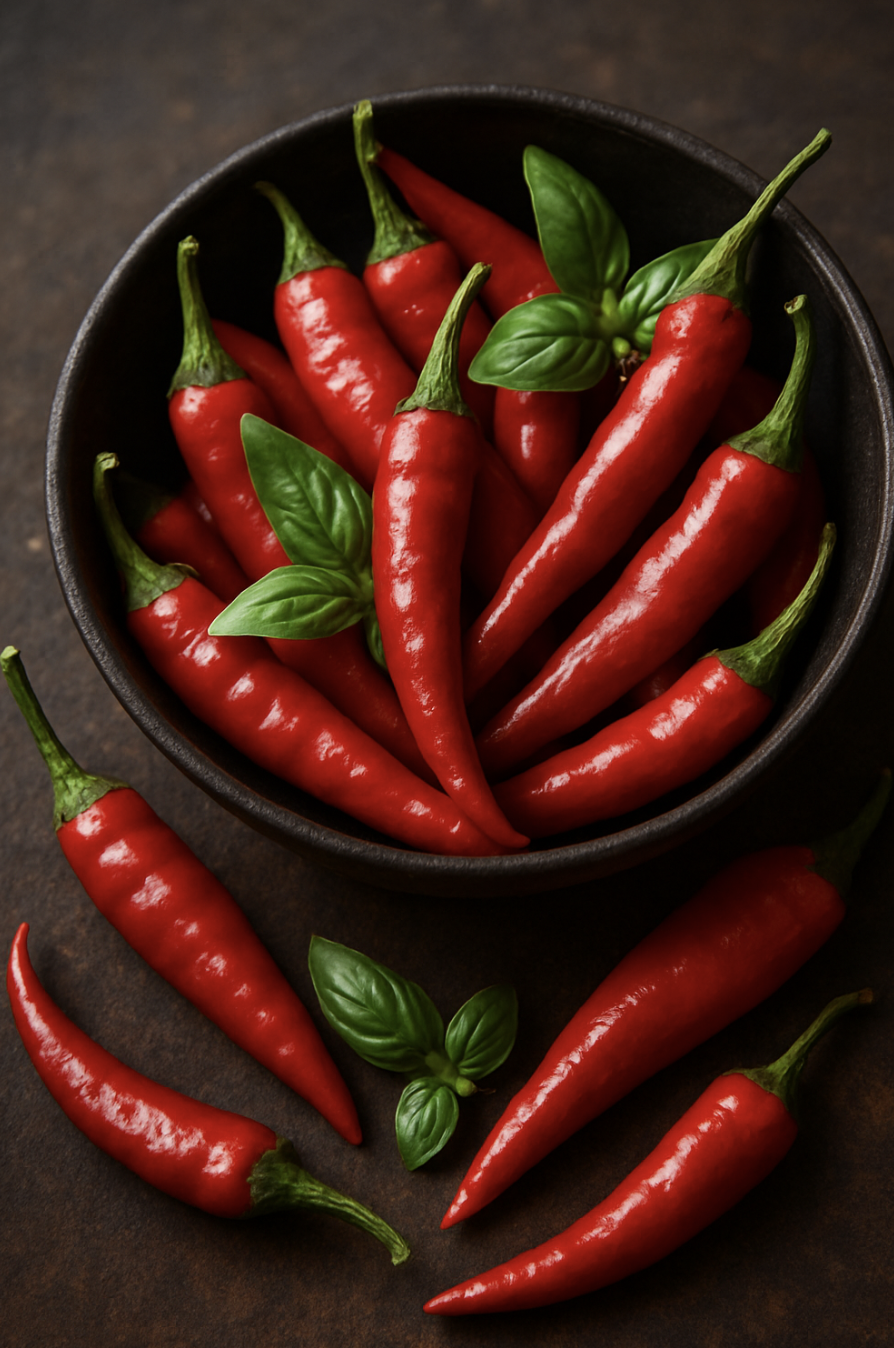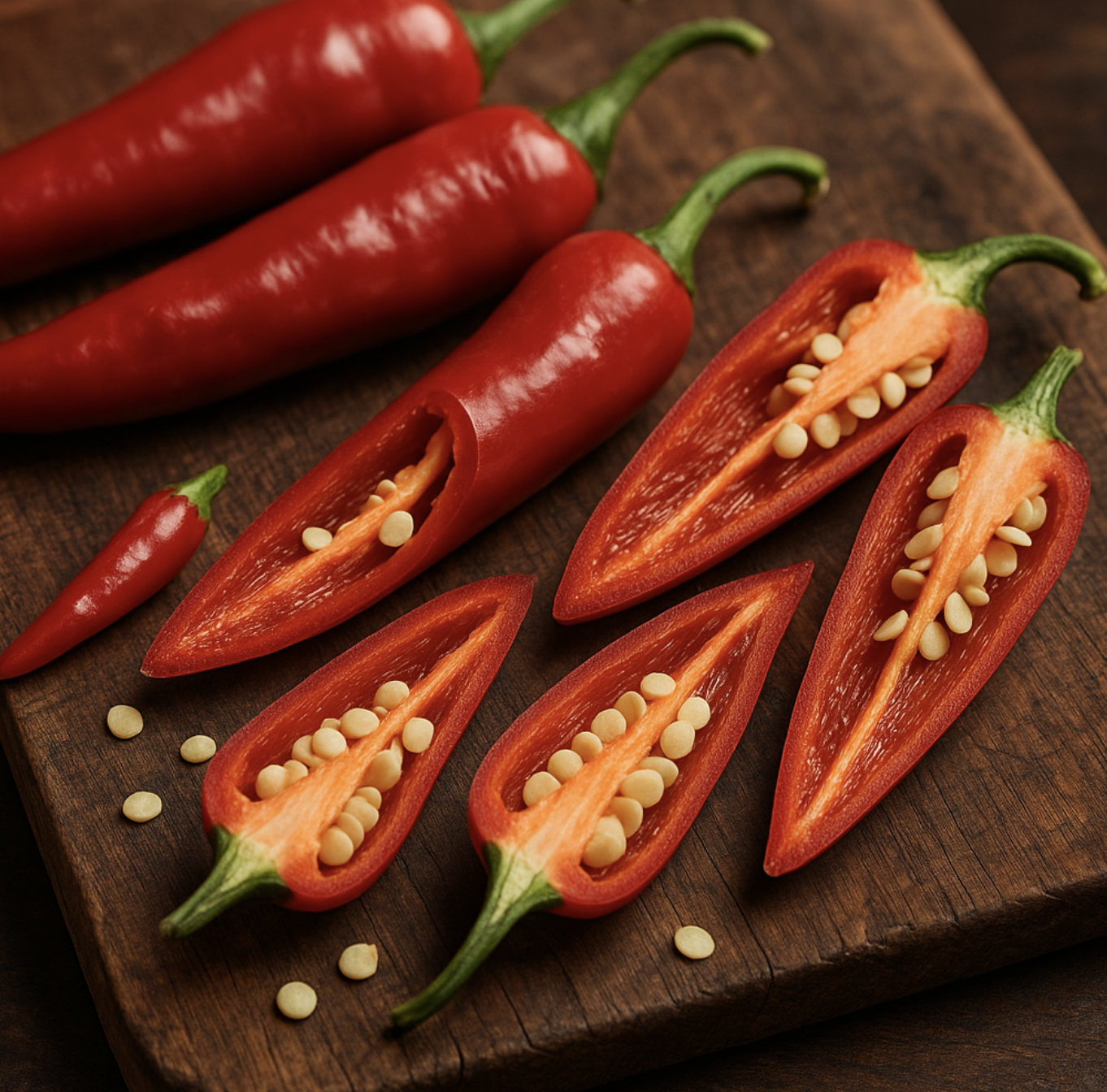The Fiery Cure: How Spicy Food Helps with Stress, Anxiety, and the Weight of Being Human
I’m personally, an absolute baby when it comes to heat. My husband uses ghost chillies in his breakfast eggs. We are not the same. There’s a reason hot sauce feels like an addiction to some people and it’s not just heat.
It’s actually healing.
Every time you bite into something blisteringly bold, your brain reacts like you’ve been wounded.
It panics…then soothes you.
Your mind screams…then releases a wash of chemicals that feel a lot like euphoria.
Spicy food, it turns out, is emotional therapy.
It makes you sweat out the sadness, cry out the tension, and in the ashes of your taste buds, something like relief rises.
Capsaicin, Endorphins, and Dopamine
Capsaicin (the molecule that gives chili peppers their heat) is a biological trickster.
It doesn’t actually “burn” you.
It simply binds to the TRPV1 receptors in your mouth and nervous system…the same receptors that detect physical heat and pain.
Your brain, completely and utterly fooled by this interaction, launches its defense with endorphins that’re released to numb the “pain”. Dopamine follows, lighting up your reward system and you feel high, calm…even a little happy.
You weren’t in danger, but your body responded as if you were, and it healed you anyway.
In a world that won’t stop spinning, bills that never stop coming, deadlines that pile up, and societal pressures, stress feels like static in the bloodstream that just won’t go away.
But spice cuts through the noise. It hijacks your nervous system (for the better) and forces you into the moment.
You’re no longer ruminating about emails or existential dread (okay, maybe you are, but at a lesser scale), you’re busy sweating, tearing up, and imagining you can now breathe fire.
It’s meditation by fire, a strange shortcut to presence, and for some of us, a way back to our bodies when anxiety tries to exile us from them.
Spicy food triggers the sympathetic nervous system…the same “fight or flight” pathway as fear and excitement. But the aftermath you get from it is a parasympathetic rebound. Your system slows, your blood flows, your brain, awash in endorphins, feels…quieter.
It's like a neurological sauna in a culinary twist…pain in, peace out.
Spice, Trauma, and Control
There’s something oddly empowering about choosing to eat something that hurts. Maybe it’s the masochist in me though. If you’ve ever felt powerless…if anxiety has ever made you its puppet…spice offers a strange sort of control to that. My ashwagandha supplements that I take by the handful seem to sigh in relief when my husband cajoles me to try his new hot sauce.
You choose the burn, ride it out with a red face, then you survive…because you were never really in any life-threatening danger to begin with. Just of choking I guess.
It’s a nice little reminder for us that not all discomfort is to be feared, some of it is a doorway. Spice offers us a way to reframe pain as progress, which I think can be applied to other aspects of our lives as well.
All over the world, spice has been used to soothe postpartum depression (India’s Ayurvedic spices), treat nausea and regulate emotion (Mexican chile rituals), increase mental clarity and alertness (Korean gochujang in winter stews), and even to celebrate survival (Ethiopian berbere spice mixes passed through generations).
These aren’t just flavor profiles, they’re emotional toolkits.
Your grandmother wasn’t just feeding you, she was fortifying you against a cruel and anxiety-inducing world. Thanks, grandma.
Research is still growing on that, but early studies seem to point toward capsaicin increasing serotonin in the gut. It stimulates the vagus nerve, which is linked to calm at the same time it temporarily increases cortisol but later lowers chronic stress levels. People who enjoy spice show greater emotional resilience in stress studies, which explains my husband’s demeanor most of the time.
It’s not a miracle drug and won’t replace any anger management or therapy you might be doing weekly (or bi-weekly like me!), but think of it more like a mechanism you can use in your anxiety tool-kit of healing.
And for those of us managing anxiety with breathing tricks and herbal teas, maybe the answer has been sitting on the hot sauce shelf this whole time.
Other Reads You Might Enjoy:
How Sugar Affects Your Immune System (And What You Can Do About It)
The Spice that Heals: How Cardamom Calms the Body, Mind, and Soul
This Common Ingredient Tricks Your Brain and Could Be Fueling Your Cravings
The Science of Awe: What Happens When Wonder Floods the Brain
Spicy Break
Organic Ghost Pepper Chili Flakes – Zak uses these because he’s crazy.
Hot Sauce Kit - okay, I use some of the less intense one in this kit for my own cooking.
Perfect for sprinkling over your stress, a little goes a long way, and so does healing.
So the Next Time You Feel Frayed Around the Edges...
Grab something hot, let the capsaicin kiss your nerves and start the fire, let your brain panic…then surrender.
And when the burn fades and your heart slows…listen to the quiet. There’s strength in using some chillies for stillness, and on the other side there’s you: sweaty, glowing, and more alive than ever.
This is what healing can look like, not just EMDR sessions and talk-therapy, drugs and padded cells.
It can also look messy, tear-streaked, and full of flavor.
Not everyone finds peace in heat (I’m still trying guys!), but those who do know: some of the best therapy comes with a Scoville rating.

